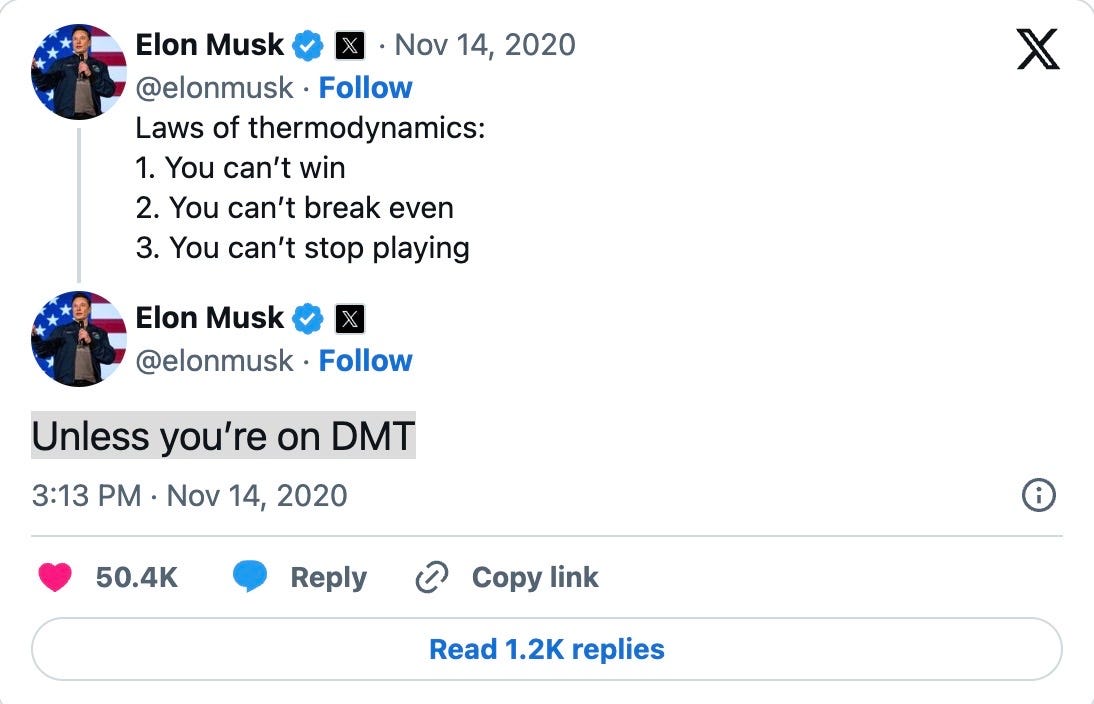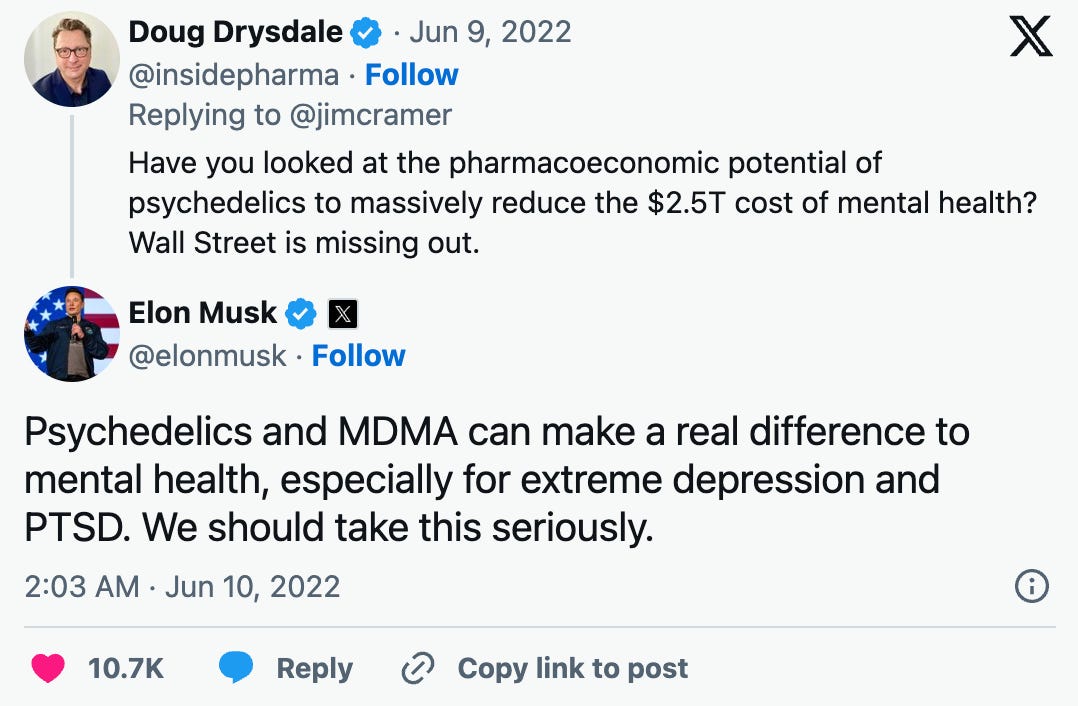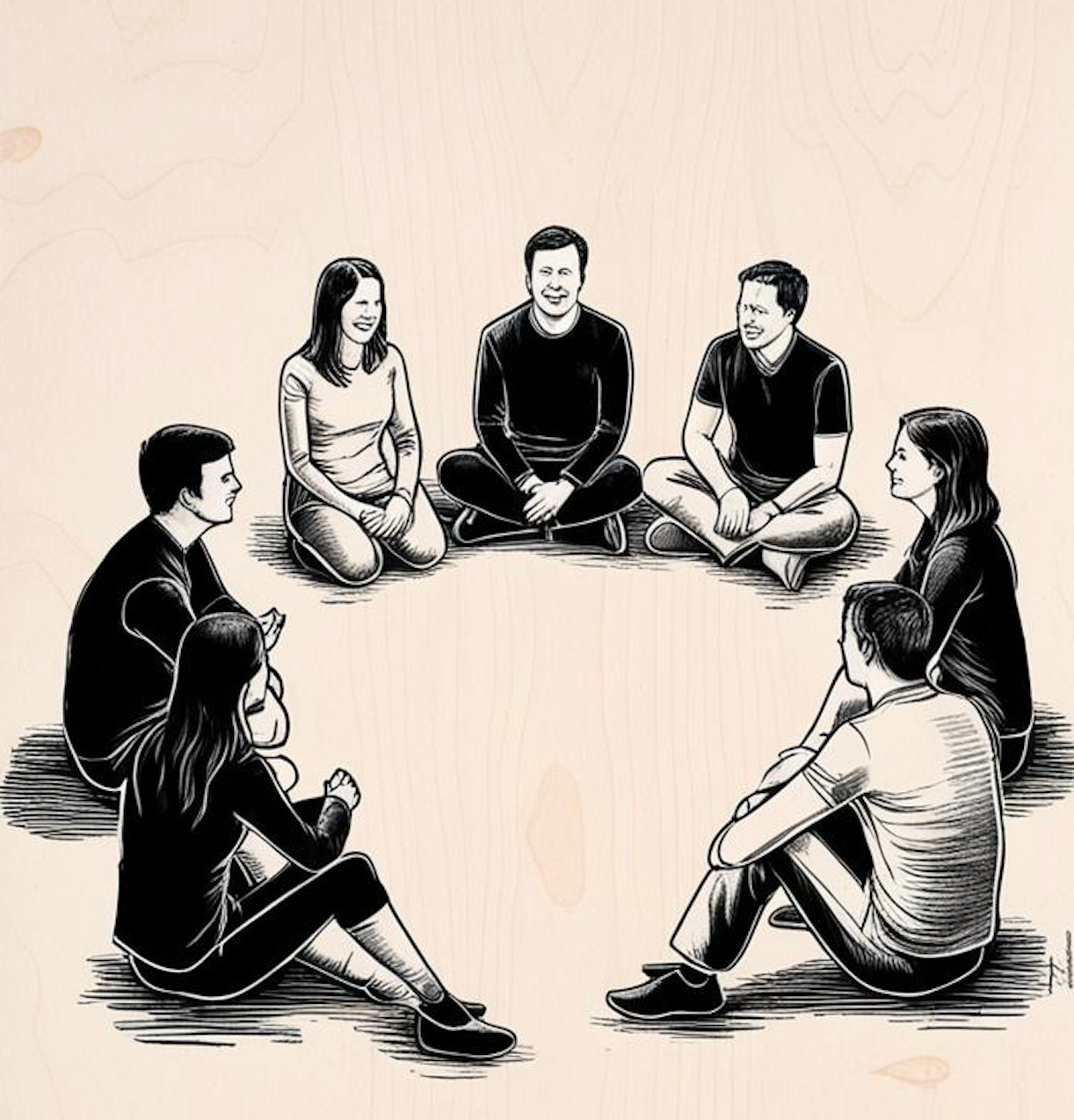Over the past few years, psychedelics have gone mainstream—not just in therapy rooms and clinical trials, but in Silicon Valley boardrooms and the minds of some of the world’s most powerful people.
One high-profile example is Elon Musk. The world’s richest man, CEO of Tesla and SpaceX, and Trump-appointed leader of the Department of Governmental Efficiency (DOGE), has openly discussed using ketamine.
Don’t know what ketamine is? That’s okay, I’m here to explain.
What is ketamine?
Ketamine is a drug that is sometimes classified as a psychedelic. Though it was originally approved by health authorities in both the U.S. and Canada as an anesthetic, it has increasingly been used therapeutically in both countries for an array of off-label applications such as depression, anxiety, pain, and more.
Musk has said publicly that he holds a prescription for ketamine and uses it about once every two weeks. He emphasized that this regimen helps him enhance his mood and maintain productivity during his long workdays.
Musk also said ketamine enhances his business acumen and benefits the bottom line of his companies. That perspective may make his example particularly attractive to entrepreneurs and executives.
“Tesla is worth about as much as the rest of the car industry combined,” he said in an interview with journalist Don Lemon in March, 2024. “We had the best selling car on earth last year. So from an investor’s standpoint, if there is something I’m taking, I should keep taking it.”
At first glance, Musk’s public endorsement of ketamine might seem like a psychedelic milestone. He has the rare privilege of speaking openly about his drug use without fear of professional or legal consequences. Here is a man who claims to work 120-hour weeks as he launches rockets, designs cars, and dismantles America’s financial and administrative systems—all while taking ketamine.
And it seems to be working for Musk? If his intention is extreme profit and productivity.
Musk’s psychedelic story is highly public because he’s untouchable. He won’t get fired, demoted, or denied a promotion because of his drug use. He won’t lose custody of his children, face criminal charges, or see his future derailed. He exists in a rarefied bubble of wealth and power where the rules don’t apply. And, of course, he loves to talk about himself.
Anyway, all of this matters because we can learn a lesson from Musk’s very visible example. Watching his recent public behaviour serves as a cautionary tale: Access to these substances does not guarantee wisdom, emotional stability, or responsible decision-making.
What matters is why, how and with whom
Doctors advise that ketamine should only be used under medical supervision. But because it can create euphoria, relaxation and a sense of wellbeing, it is also sometimes used recreationally. And supervised ketamine therapy is expensive, so some people buy it in the underground and self-treat their mental health concerns with no supervision.
When used without medical advice, ketamine comes with risks. It can cause bladder problems, detachment from reality, and impaired judgement. It can also be addictive when there’s no doctor there to monitor dosing or frequency. A doctor would notice and act if treatment becomes harm.
While we don’t know for sure whether Musk uses ketamine outside of his twice-monthly prescribed use, we do know that he could if he felt like it. We know that ketamine isn’t hard to source through illicit avenues, especially for someone with money and power. There’s nothing to stop Musk and he does seem like a more-is-better kind of guy.
Is it insight, or is it illusion?
Beyond ketamine, Musk has expressed support for psychedelics in general, tweeting that he believes they can be beneficial for mental health. His perspective is shared by many in the psychedelic movement, where substances like psilocybin, LSD, and DMT are being explored for their potential to treat PTSD, addiction, depression, anorexia, and existential distress related to terminal illness, among many other serious mental health conditions.
But here’s the paradox: while psychedelics can offer deep insights and radical perspective shifts, they don’t automatically put someone right. The sheer intensity of a psychedelic experience can create a powerful illusion of truth—what feels like a profound revelation in the moment might not hold up under next-day scrutiny. Without medical advice, without a strong foundation of self-awareness, and without a community of accountability, psychedelics can amplify the very issues they are meant to heal.
Grandiosity is not good
Psychedelics are known as “amplifiers.” They can turn up the volume on existing traits, beliefs, and behaviour—for better or worse. When used recklessly, they may fuel delusions, impulsivity, or grandiosity rather than provide clarity or healing. This is why set, setting, and post-experience reflection are just as crucial as the substance itself.
No drug can replace self-awareness, emotional regulation, or genuine psychological work. Psychedelics may offer insights, but it’s what we do with those insights that truly matters. When used with intention and care, they can unlock new ways of thinking, boost creativity, and offer profound emotional breakthroughs. But when used as a shortcut to override the psychological strain of an unsustainable lifestyle—they can reinforce grandiosity, detachment, and delusion.
Ketamine can be addictive
In tech culture—where optimization and biohacking often overshadow real self-reflection—it’s easy to see how ketamine could seem like just another cheat code, a way to chemically override stress rather than address its root causes.
What’s really concerning about Musk’s story is that he—as the richest and most powerful person in literally every room—lacks a true community of accountability. Who in his orbit can tell him, “Hey, this ketamine-fuelled decision to rip apart USAID might not be so great”? Who can challenge his increasingly erratic behaviour and expect him to listen?
A key tenet of psychedelic healing is integration—having trusted people to help process insights and course-correct if needed. But when you sit at the top of the hierarchy, with no equals and no consequences, what will keep you in check? Who will tell you you’re using too much, too often?
Not only that, who will question how Musk speaks about his ketamine use with the suggestible people around him? Who will point out that it might not be a good idea to share your supply with your 20-year-old devotees? (Oops! I mean employees.)
Questions probably won’t come from those employees, who are between the ages of 19 and 24 and are said to be working 120 hours per week under Musk’s supervision. Seems like there might be a lack of boundaries happening at DOGE? But, hey, productivity is through the roof.
Transcendence isn’t guaranteed
Musk’s use of ketamine isn’t just about Musk. It’s a reflection of a larger shift in how powerful people are experimenting with substances to enhance cognition and cope with the pressures of modern life. Some see this as a sign of progress—a new era where psychedelics are embraced as tools for self-improvement and innovation.
But I see it as a warning. We are moving toward a world where productivity and performance are chemically enhanced, while deeper systemic issues remain unaddressed. No drug—not ketamine, psilocybin, LSD, DMT, cannabis, MDMA, whatever—can magically fix a broken system.
Psychedelics work holistically, as part of a larger shift. When combined with relational support, they can expand our minds, challenge our assumptions, and even heal deep wounds. But without that relational support, they can be used to escape, avoid difficult realities, or reinforce unhealthy patterns of thinking and behaviour. What they amplify depends on the person, their mindset, and the culture around them.
It looks to me like ketamine is amplifying Musk.
It looks to me like he lacks community.
It looks to me like he’s avoiding accountability.
Of course, I’m not a doctor. But I don’t think you have to be an expert to see what I’m describing. It’s happening in full view.
What can we learn from observing Elon Musk?
If you’re wondering whether you should try ketamine, or mushrooms, or MDMA, or whatever psychedelic, I recommend you focus less on which substance you should take and more on why and how and with whom.
Are you using psychedelics to enhance your current path—boosting productivity, creativity, or mood? Or are you open to true introspection, allowing the experience to shift your perspective and possibly change your direction? If not, you might not be truly helping yourself.
Will you be relating to other humans following your psychedelic trip? Will you have regular opportunities to revisit and process the psychedelic experience you had—in relationship to at least one other caring, competent human being? If not, you risk missing out on the true healing.
Musk’s privilege is his weakness
In my opinion, Musk’s psychedelic use isn’t proof of psychedelic progress—it’s proof of psychedelic privilege, and how extreme privilege can be harmful—even for the person who holds the privilege.
We can also look at actor Matthew Perry’s life and death as an example of this. Like Musk, he was using prescribed ketamine therapeutically. After his death in 2023, we learned that he was also using illicit ketamine at home, unsupervised by a doctor. He lacked a community of accountability because of his wealth and fame, and his highly resourced, unwise use of ketamine ultimately resulted in his death by drowning.
If there’s a lesson in these celebrity stories, it’s that psychedelics without accountability can become another tool for self-delusion. Healing, growth, and insight don’t come from a chemical. They come from intention, integration and community.
So. Who’s going to mention this to Musk? He could be hurting himself. And he could be taking America down with him.
One woman’s journey with ketamine
For Veronica,* a New York-based communications professional and mother, ketamine has been a lifeline during one of the most challenging periods of her life.











